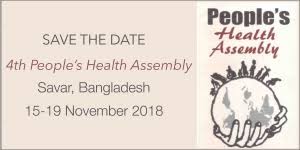The 4th People’s Health Assembly marking the 40th anniversary of Alma Ata Declaration on Primary Health Care will be held in November at Savar, near Dhaka.The People’s Health Movement with mark the anniversary of landmark Primary Health Care declaration of Alma Ata with 4th People’s Health Assembly in Bangladesh from 15-19 November next
40 years since the groundbreaking Alma Ata declaration the People’s Health Movement will return to Bangladesh for the 4th People’s Health Assembly (PHA4). The event will take place from 15 to 19 November 2018 at Savar, (near Dhaka) Bangladesh, 18 years after the first People’s Health Assembly was held here.
In the context of escalating threats to health worldwide and the shift away from Primary Health Care, the Assembly will bring together civil society organizations and networks, social movements, those from academia and other stakeholders from around the globe to share experiences, for mutual learning and to develop joint strategizing to fight back against neoliberal approaches to health.
People’s Health Movement (PHM) is a global network bringing together grassroots health activists, academics, policymakers and practitioners, civil society organizations and academic institutions from around the world, particularly from low and middle income countries (L&MIC). PHM currently has a presence in over 80 countries. Guided by the People’s Charter for Health (PCH), PHM works on various programmes and activities and is committed to Comprehensive Primary Health Care and addressing the Social, Environmental and Economic Determinants of Health.
PHM organized the first PHA in Savar, Bangladesh in December 2000 and more than 1400 people from 75 countries attended. Participants developed and endorsed the People’s Charter for Health, PHM’s founding document. The second Assembly was held in Cuenca, Ecuador in July 2005 and attended by 1492 people from 92 countries. The third Assembly was held in Cape Town (South Africa) in July 2012 and attended by about 1000 people from over 90 countries.
The objectives of this Assembly and associated activities include:
– To evaluate and critically analyze current processes and policies impacting health and healthcare at global, regional and local levels;
– To collectively review PHM’s organization and programming and to provide a renewed mandate for the years to come;
– To enhance the capacity of civil society health activists to engage with and intervene in the policy making process, to monitor and drive policy implementation and to ensure accountability in the functioning of health systems;
– To foster and support constructive dialogue, planning and mobilization around health and the broader social determinants of health,
– To launch renewed sustainable structures and dynamics, both within and outside the health sector, that will continue to drive coordinated action to secure universal and equitable access to health and health care.
The PHA4 will focus on four main themes or “thematic axes” of PHA-4 that PHM will continue to develop over the next several months:
The political and economic landscape of development and health: Addressing issues ranging from the dominant economic model of development, power relations between and within countries, trade agreements, and the role of powerful actors such as multinational countries. It will also address the underlying factors, global and regional, which are driving forced migrations and precipitating a humanitarian crisis in many regions of the world.
Social and physical environments that destroy or promote health: Examine factors related to social and environmental conditions and how they contribute to inequity in access to healthcare services and to social determinants of health. It will look at power dynamics associated with class, gender, ethnicity, caste, and others that are being exacerbated by rising xenophobia, war-mongering and intolerance. Under this theme we will also examine the increasing responsibility of forced migration, conflict, climate change and environmental degradation for the profound impact these dynamics have on health outcomes.
Strengthening health systems to make them just, accountable, comprehensive, integrated and networked: Debate alternative models of healthcare delivery that are better suited to promote equity in access, that are fair, and that promote accountable systems built around popular participation.
Organizing and mobilizing yet again for Health for All: A key aspect of the struggle for health is the numerous struggles and actions by groups, peoples, movements, NGOs, and community-based organizations. PHA4 will be a platform for sharing experiences, mutual learning and strategizing for future action and a source of inspiration for the continuing struggle.
We expect about 1500 participants from across the globe to attend the Assembly, particularly from low and middle income countries. Participants will be mobilized through country and regional mobilization processes leading up to the Assembly and will include representatives of civil society organizations/networks (including non-governmental organizations, community-based organizations, trade unions, professional associations); governments, intergovernmental bodies, academic institutions, and many more. – Thurd World Network




